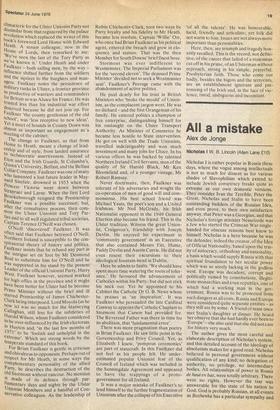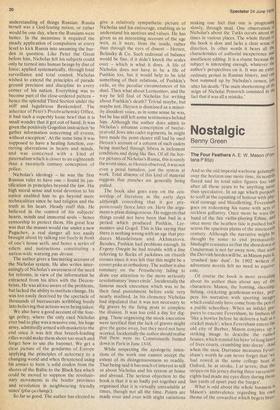All a mistake
Alex de Jonge
Nicholas I W. B. Lincoln (Allen Lane 0)
Nicholas I is rather popular in Russia these days, where the vogue among intellectuals is not so much for dissent as for various shades of Slavophilism which extend to include Jewish conspiracy freaks quite as extreme as our own domestic versions.
They consider Ivan the Terrible, Peter the Great, Nicholas and Stalin to have been outstanding builders of the Russian Idea, and even prove, to their own satisfaction
anyway, that Peter was a Georgian ,and that Nicholas's foreign minister Nesselrode was a Jew who started the Crimean War singlehanded for obscure reasons best know to himself. Nicholas is a hero because he was the defender, indeed the creator, of the Idea of Official Nationality, based upon the trinity of autocracy, orthodoxy and nationality, a basis which would supply Rt1ssia with that spiritual foundation to her secular power which was so sorely lacking in the godless west. Europe was decadent, corrupt and politically ruined by constitutions, illegitimate monarchies and even republics, one of which had a working man in the government. Russia was to be protected from such dangers at all costs. Russia and Europe were considered quite separate entities — as they still are by some. A friend of mine once met Stalin's daughter at dinner. He heard her observe that she had hardly ever been to 'Europe' —she also said that she did not care for history very much.
The author gives the most careful and elaborate description of Nicholas's system, and this detailed account of the ideology of absolutism makes for a good read. Nicholas believed in personal government without qualification of any kind; no delegation of authority, no privilege, no intermediary bodies. All relationships of power in Russia de haut en bas, were totally arbitrary. There
were no rights. However the tsar was answerable for the state of his nation to
God. God is probably Russian, at all events as Bozhenka has a particular sympathy and
understanding of things Russian. Russia herself was a God-fearing nation, or rather would be one day, when the Russians were better. In the meantime it required the steady application of compulsion at every level to kick Russia into assuming the burden in question. Like Peter the Great before him, Nicholas felt his subjects could only be turned into human beings by dint of force; applied systematically, through total surveillance and total control. Nicholas wished to extend the principles of parade ground precision and discipline to every corner of his nation. Everything was to become part of the close-ordered pattern — hence the splendid Third Section under the stiff and lugubrious Benkendorf. The inheritor of Peter's Preobrazhensky Office, it had such a superbly loose brief that it is small wonder that it got out of hand. It was given the positively Gogolian instruction 'to gather information concerning all .events, without exception'. At the same time it was supposed to have a healing function, correcting aberrations in hearts and minds, and was conceived with a kind of paternalism which is closer to an eighteenth than a twentieth century conception of police. _
Nicholas's ideology — he was the first Russian ruler to have one — found its justification in principles beyond the law. His high moral sense and total devotion to his nation enabled him to go beyond mere technicalities since he had religion and the truth in his heart. Heady stuff this. He believed in the control of his subjects' hearts, minds and immortal souls — hence censorship to protect them. His great fear was that the masses would rise under a new Pugachev, a real danger all too easily brought about by talking too freely in front of one's house serfs, and hence a series of edicts and instructions constituting a nation-wide warning pas devanl.
The author gives a fascinating account of the Nicholas system. He also writes interestingly of Nicholas's awareness of the need for reforms, in view of the information he extracted from his tetes with the Decembrists. He was all too aware of the problems, but lacked the ability to institute change. He was too easily deceived by the spectacle of thousands of bureaucrats scribbling busily into believing that actions were being taken.
We also have a good account of the foreign policy, where the only. card Nicholas ever had to play was a massive one, his huge army, admittedly armed with muskets to the end since it was felt that breech-loading rifles would make them shoot too much and forget how to use the bayonet. We get a clear picture of the gendarme of Europe applying the principles of autocracy to a changing world and when threatened using his armies to form 'a solid cordon from the
shores of the Baltic to the Black Sea which could be moved to suppress the revolutionary movements in the border provinces and revolution in neighbouring friendly states' (plus ca change).
So far so good. The author has elected to give a relatively sympathetic picture of Nicholas and his entourage, enabling us to understand his motives and values. He has given us an interesting account of the age seen, as it were, from the inside, rather than through the eyes of dissent — Herzen, Belinsky & Co. Such redressal of balance would be fine, if it didn't knock the scales over — which is what it does. A life of Nicholas does not have to be a life of Pushkin too, but it would help to be told something of their relations, of Pushkin's exile, or the peculiar circumstances of his duel. Then what about Lermontov, and the way he fell foul of Nicholas for writing about Pushkin's death? Trivial maybe, but maybe not. Herzen is dismissed as a minor ity dissident voice, as in some sense he was, but he has still left some testimonies behind him. Although the author does admit to Nicholas's inhuman conscription of twelveyear-old Jews into cadet regiments, he might have made the point clearer still had he used Herzen's account of a column of such cadets being marched through Sibera in inclement conditions and dying like flies. Of all the horror pictures of Nicholas's Russia, this is surely the worst since, as Herzen observed, it was not even a penal battalion, just the system at work. Total absence of this kind of material suggests that punches are generally being pulled.
The book also goes easy on the censorship of literature in the early days although conceding that it got pre posterously fierce later on. Here the argument is plain disingenuous. He suggests that things could not have been that bad in a period which produced Pushkin, Lermontov and Gogol. This is like saying that there is nothing wrong with an age that pro duces Mandelstam and Akhmatova. Besides, Pushkin had problems enough. In
Evgeny Onegin he had trouble with a line
referring to flocks of jackdaws on church crosses since it was felt that this might be a covert poke at orthodoxy. The author is also summary on the Petrashevtsy failing to draw our attention to the more seriously revolutionary 'inner circle'. Incidentally the famous mock execution which was to be their final punishment before exile very nearly misfired. In his clemency Nicholas had stipulated that it was not necessary to dig graves by the firing posts to complete the illusion. It was too cold a day for dig ging. Those organising the mock execution were terrified that the lack of graves might give the game away, but they need not have worried. Incidentally the author should realise that there were no Communards hunted down in Paris in June 1848. , While respecting the apologetic intentions of the work one cannot accept the extent of its disingenuousness so readily.
That being said it has much of interest to tell us about Nicholas and his system at home and abroad. The serious objection to the book is that it is so badly put together and organised that it is virtually unreadable at times, though not all the time. Points are made over and over with slight variations
making one feel that one is progressing, slowly, through mud. One observation Nicholas's about the Turks occurs about sO times in various places. The whole thrust of the book is slow and lacks a clear sense d direction. In other words it bears all the characteristics of authorial inexperience and insufficient editing. It is a shame because the subject is interesting enough, whatever the author's perspectives on it, It was an extra' ordinary period in Russian history, and one best summed up by Nicholas's censor, just after his death: 'The main shortcoming of the reign of Nicholai Petrovich consisted in the fact that it was all a mistake.'















































 Previous page
Previous page